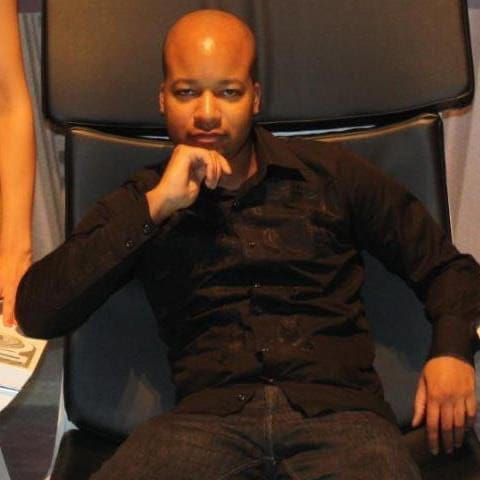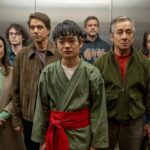
The first Pacific Rim wasn’t a masterpiece in storytelling. It didn’t have the deepest plot, or characters with deeply thought-provoking arcs. What it did have was giant mechs fighting giant monsters. It had enough heart to make you care about both the mechs (known as Jaegers) and the humans inside them, and the stakes were high enough that there was tension in every fight scene. None of that has been carried over to the sequel, which we’ll detail in our Pacific Rim Uprising review.
Guillermo del Toro directed the first Pacific Rim and had a hand in not only writing the screenplay, but also filling out the universe in an effort to expand into comics, TV and additional films. He understood the universe and he clearly loved working within it as evidenced by the first film and the passion he put into that project. Pacific Rim Uprising is directed by Steven S. DeKnight, whose previous directorial efforts are limited to one episode of the Netflix Daredevil series, one episode of the old Fox show, Dollhouse, two episodes of Smallville and three episodes of Angel.
DeKnight’s resume isn’t particularly impressive, and Pacific Rim Uprising doesn’t make it any better. The original writing team of the first film (del Toro and Trvis Beacham) were not involved in the script for Pacific Rim Uprising, and that’s glaringly obvious as you watch the film. The new writing team, led by DeKnight, is best known for the Maze Runner series, which isn’t exactly quality work. The result is a sequel that feels completely disjointed from the first film and more like a soulless Transformers movie.
Pacific Rim Uprising doesn’t just insult the world del Toro created in the first film, it doesn’t even remain consistent. There’s no rhyme or reason to most of the events in Uprising. Everything seems to happen by convenience instead of any kind of real plot point. Why are the leaders of Earth interested in a drone Jaeger army when the Kaiju haven’t been seen or heard from in over a decade? How is it we even have the resources to create a Jaeger army after the Earth was ravaged by Kaiju, when 10 years ago it was a huge effort just to make three Jaegers? Why are category four Kaiju in Uprising the same size as category two Kaiju in the first film? Uprising isn’t a film that needs to be grounded in logic, but if there are glaring issues like these it takes you out of the enjoyment of the film. The first film straddled this line with ease and made everything work. Uprising just doesn’t seem to care.
Unfortunately, the cast doesn’t help to salvage the film since they’re working with a script that rivals recent Transformers films in terms of sheer ignorance. John Boyega plays Jake Pentecost, the son of Stacker Pentecost, played by Idris Elba in the first film. He does everything he can with a terrible script, but it’s not enough to bring the character to life. Even if you ignore the fact that Jake was never once mentioned in the first film, despite Stacker having an adopted daughter who was featured prominently, his character arc simply doesn’t make sense. Jake is trying to make his deceased father proud, and appears to be very close to his adopted sister, Mako Mori (Rinko Kikuchi), yet wants nothing to do with the Jaeger program that both were a huge part of.
Scott Eastwood takes on the role of Nate Lambert, a Jaeger pilot who has a sordid past with Jake. Somehow what starts as clear animosity between the two suddenly turns into a solid working relationship in a matter of movie minutes. Script issues aside, Eastwood wasn’t great in The Fate of the Furious, Suicide Squad, or most of his other films, and that lackluster acting continues in Uprising. He plays a standard issue military officer with nothing to differentiate him from any other military officer in any other similar film. You could swap his character and lines for those of Captain Lennox (Josh Duhamel) from the Transformers series and no one would notice a difference.
Speaking of Transformers, Pacific Rim Uprising essentially plays out like a Michael Bay Transformers film that’s been hastily shoved into the Pacific Rim universe. In the first film you got to know the Jaegers just as much as the main pilots. When a Jaeger took damage you felt for the pilot and hoped the machine would make it to the next battle. Guillermo del Toro did an excellent job making each battle sequence massive in scale and visceral in nature. None of that translates to the battles in Uprising. There’s no emotion for the pilots or the Jaegers, and the action is on par with Transformers instead of offering the highly choreographed and far more entertaining fights of the first Pacific Rim.
If you enjoy the Bayformers films, Pacific Rim Uprising is right up your alley. It’s very clear that Uprising was modeled after Transformers instead of the first Pacific Rim. That’s a decision that will turn off a lot of Pacific Rim fans, and while it may bring in a number of Transformers fans, Transformers: The Last Knight is the worst performing film in the franchise by a large margin. Clearly audiences want more out of their films, and they won’t get that in Pacific Rim Uprising.
The only saving grace for Pacific Rim Uprising is the fact that the end of the film clearly sets up for Guillermo del Toro’s original sequel idea. If Uprising makes enough money for a third film to happen (unlikely), we can only hope del Toro returns to right the wrongs that have been made here. It’s a long shot, but that’s all the hope we can have after Steven S. DeKnight has taken a love letter to Japanese Kaiju films and made it into just another less than stellar Transformers knock off.
About Pacific Rim Uprising
Synopsis: Jake Pentecost, son of Stacker Pentecost, reunites with Mako Mori to lead a new generation of Jaeger pilots, including rival Lambert and 15-year-old hacker Amara, against a new Kaiju threat.
Director: Steven S. DeKnight
Writers: Steven S. DeKnight, Emily Carmichael, Kira Snyder, T.S. Nowlin
Stars: John Boyega, Scott Eastwood, Cailee Spaeny
Rated: PG-13
Runtime: 1 Hour, 51 Minutes
Bryan Dawson has been writing professionally since the age of 13. He started his career as a video game writer and has since worked for Random House, Prima Games, DirecTV, IGN, AOL, the British Government, and various other organizations. For GNN, Bryan taps into his passion for movies.





























